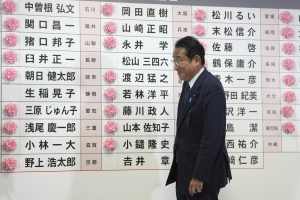Japan’s ruling coalition, led by the Liberal Democratic Party (LDP), won the upper house election on July 10, increasing its majority two days after the fatal shooting of former Japanese Prime Minister Abe Shinzo. While exit polls had projected a victory for the LDP and junior coalition partner Komeito, they scored a 52 percent majority, surpassing initial expectations by poll watchers.
The upper house election went ahead amid a record-breaking heatwave and fierce debate over national security, the Russian invasion of Ukraine, a weak yen, and the rising cost of living. But it will also go down in history for its connection to Abe’s assassination in the final stages of election campaigning.
The election victory ushers in a fresh mandate for Prime Minister Kishida Fumio. It is his second consecutive victory in a national election after taking office in October last year. But his electoral success will also put his leadership to the test, as Japan faces a mountain of long-term domestic and international issues.
A total of 125 seats were up for grabs in the upper house. The LDP and Komeito together won 76 seats, attracting 18.3 million votes, an increase of 540,000 votes compared to their total in the 2019 polls. This is in part due to a higher voter turnout, which was 3 percentage points higher this year than in 2019.
Japan’s main opposition party, the Constitutional Democratic Party of Japan (CDP), secured only 17 seats, down from 23.
Japanese politics has been criticized for its “one-party democracy,” which has seen the LDP dominating government with few breaks since 1955. The CDP is Japan’s largest opposition party in the upper house, but it failed to make headway and provide an appealing alternative. CDP leader Izumi Kenta, who took on the top position in November last year, publicly acknowledged defeat and took responsibility for the less than impressive outcome. “We have not reached the point where the public recognize us as a force that could govern the country,” he said at a press conference. His future as CDP leader is also in jeopardy as the party reconfigures and heads back to the drawing board.
The conservative right wing populist party, Nippon ishin no kai (Japan Innovation Party), secured 12 seats. The fledgling political party has become Japan’s largest opposition party following its electoral success in the lower house election in October last year.
Meanwhile, the center-right Democratic Party for the People won five seats, the Communist Party won four seats, and the left-wing populist group Reiwa Shinsengumi won three seats, followed by one seat each for the Anti-NHK Party and Social Democratic Party and five seats won by independent candidates.
Members of the upper house serve six-year terms and stay for the full term, which is designed to help tackle long-term political issues. Every three years, half of the chamber’s seats are up for re-election. Japan’s bicameral elation system gives a higher precedence to the lower house as it is seen as a better reflection of the “will of the people” than the upper house.
Coming so soon after Abe’s murder, the LDP’s victory took a somber tone. Instead of celebrations, Kishida and other officials and close friends of Abe attended his funeral on Tuesday.
There will be many shifts in the internal dynamics of the LDP, with Abe’s assassination leaving a gaping hole. As an elite and influential member of the LDP, Abe was a symbol of stability and experience.
The LDP has been referred to as a “department store,” home to both hawks and moderates. Commentators have suggested the poor election outcome for the CDP could also be linked to Kishida’s image is as somewhat of an “opposition figure” within the LDP, which contains various factions. Kishida was known as a moderate and China dove, but he is believed to have adopted a tougher attitude on China to garner votes from elite members of the LDP in order to win the internal presidential election in September 2021.
After the upper house elections, Kishida vowed to “build on Abe’s accomplishments” and called for greater party cooperation in order to fulfill Abe’s goals of strengthening the military’s counter-attack capabilities and revising Japan’s pacifist constitution. While Kishida mourns a longtime friend, his election victory gives the administration the confidence and public backing to formulate its own signature policies.
Abe’s tragic killing marks the abrupt end of an era. When Abe stepped down unexpectedly in August 2020 due to chronic health problems, there were hints of a political comeback. As Japan’s longest-serving prime minister in history, Abe became a familiar face and household name. He garnered a reputation as Japan’s most respected politician and was known as the flag bearer for conservatism. The Abe political faction within the ruling LDP remains the party’s biggest faction.

































